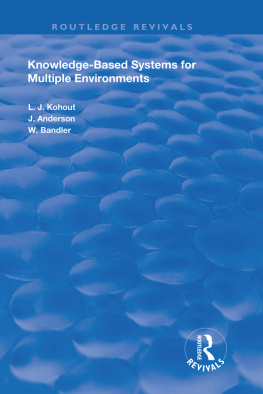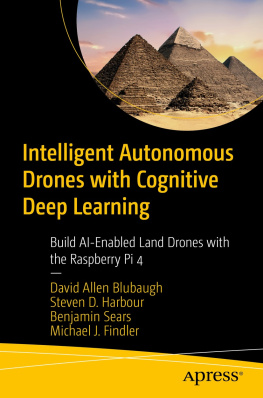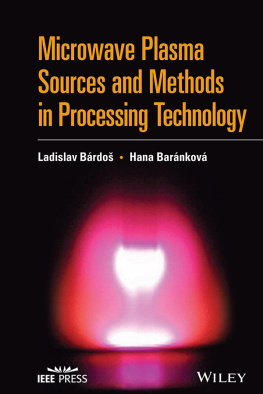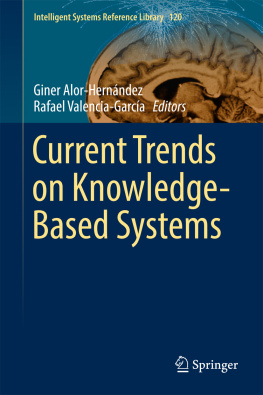Knowledge-Based Systems for Multiple Environments
First published 1992 by Ashgate Publishing
Reissued 2018 by Routledge
2 Park Square, Milton Park, Abingdon, Oxon, 0X14 4RN
52 Vanderbilt Avenue, New York, NY 10017
Routledge is an imprint of the Taylor & Francis Group, an informa business
Copyright L.J. Kohout, J. Anderson, W. Bandler 1992
All rights reserved. No part of this book may be reprinted or reproduced or utilised in any form or by any electronic, mechanical, or other means, now known or hereafter invented, including photocopying and recording, or in any information storage or retrieval system, without permission in writing from the publishers.
Notice:
Product or corporate names may be trademarks or registered trademarks, and are used only for identification and explanation without intent to infringe.
Publishers Note
The publisher has gone to great lengths to ensure the quality of this reprint but points out that some imperfections in the original copies may be apparent.
Disclaimer
The publisher has made every effort to trace copyright holders and welcomes correspondence from those they have been unable to contact.
A Library of Congress record exists under LC control number: 92147292
ISBN 13: 978-1-138-38660-0 (hbk)
ISBN 13: 978-0-429-42673-5 (ebk)
About the Editors
Ladislav J. Kohout is Professor of Computer Science at Florida State University. The innovative methodology in his recent book, Pespectives on Intelligent Systems: A Framework for Analysis and Design, has provided the unifying conceptual structure of the present volume. Professor Kohout is the U.S. editor of the Journal of Intelligent Systems. In 1988 Professor Kohout received an international prize from the Systems Research Foundation, Outstanding Scholarly Contribution Award for developing his Methodology of Activity Structures.
John Anderson is Professor Emeritus at Kings College School of Medicine and Dentistry in the University of London. He is Fellow of the British Computer Society (BCS), Fe)low of the Royal Society of Medicine and Fellow of the Institute of Biology. Professor Anderson was founding editor of the International Journal Medical Informatics Informatique et Mdecine for many years. He is a Founding Member of AAMSI, an Americal Medical Systems Society and served for a number of years as the Chairman of the BCS specialist group on Medical Computing.
Wyllis Bandler is Professor of Computer Science at Florida State University, where he is a founding member of the Institute for Cognitive Sciences and the Institute for Expert Systems and Robotics. His research specializations include problems of Knowledge Representation and the Theory and Applications of Crisp and Fuzzy Relations, in particular Relational Methods for Knowledge-Based Systems. He is on the editorial board of the International Journal of Approximate Reasoning , and a Member of the Board of Directors of the North-American Fuzzy Information Processing Society.
List of Contributors
John Anderson (editor)
Kings College School of Medicine and Dentistry
University of London, England, U.K.
Wyllis Bandler (editor)
Department of Computer Science
and Institute for Cognitive Sciences
Florida State University Tallahassee, Florida 32306, U.S.A.
Ali Behrooz
Department of Computer Science
Middlesex Polytechnic (Hendon)
London, England, U.K.
Mohamed Ben-Ahmeida
Misurata Research Centre for Engineering Sciences
P.O. Box 668, Misurata, Libya
North Africa.
Farouk Dowlatshahi
Department of Electrical Engineering
Brunei University of West London
Uxbridge, Middx. England, U.K.
Song Gao
Department of Computer Science
Northern Jiaotong University
Beijing 1000 44, CHINA
Christopher C. Johnson
School of Computing Sciences
University of Technology Sydney
Broadway Campus
Broadway NSW, Australia
Hasan Kalantar
Department of Computer Science
Middlesex Polytechnic (Hendon)
London, England, U.K.
Ladislav J. Kohout (editor)
Department of Computer Science
and
Institute for Expert Systems and Robotics
Florida State University Tallahassee, Florida 32306, U.S.A.
Garry Marshall
GEC
Hirst Research Center
Wembley, Middx. HA2 OJL
England, U.K.
Vasco Mancini
Architecture and Environments
Colchester, Essex, England, U.K.
and
Department of Computer Science
Florida State University Tallahassee, Florida 32306, U.S.A.
Thorbjoern Mann
School of Architecture
Florida A & M University
Tallahassee, Florida, U.S.A.
Sabah M.A.M Mohamad
Computer Science Department
College of Science
Saddam University, P.O.Box 47077, A1 Jadiryiah
Baghdad, Iraq
Chris Trayner
Department of Physics
University of Essex
Colchester, Essex, England, U.K.
Stephanie Weisbauer
Boltzmann Institute for Social Gerontology
University of Vienna
Vienna, Austria
Preface
This book identifies the problems facing the designer of multi-environmental knowledge-based systems, and explains the principles which must be followed to obtain successful results.
Systems based upon knowledgewhether they are computer systems or notare increasingly called upon in the modern world to function in a variety of widely differing environments. Even the best present-day knowledge-based systems, however, display often fatal flaws when the environment in which they are used alters even slightly. The need for software deliberately constructed for multi-environmental use is being felt ever more widely, and will be increasingly demanded in fifth (and sixth) generation machines. Such systems must be able to perform satisfactorily over a wide band of varying environments, whether these arise because of the individual or cultural diversity of users or their changing circumstances, or because of the rapid progress of the technology upon which the knowledge of the system is based.
This volume is the first full-scale discussion of such systems, the requirements they must meet, and the methodology for designing and evaluating them. While primarily aimed at workers in Artificial Intelligence and Expert Systems, as well as the producers of other kinds of sophisticated software, the content of the book is of wider validity, just as the multi-environmental demands are of wider incidence. It will also be of great interest to:
Serious designers of software with a large and variable knowledge component.
Builders of systems for use in the Third World that would match carefully the local environmental, cultural and economic conditions of each particular developing country.
Planners, designers and prospective users of systems intended to withstand the effect of technology transfer.
Builders of computer design tools, and in general,
Designers of extended expert database systems or other ambitious knowledge-based systems.
The book can also be used as the second text in a number of courses in knowledge engineering, expert systems and applied AI. Not only departments of computer science and electrical engineering, but also other department such as psychology, business administration, and indeed those in any branch of science and engineering offering graduate courses and pursuing research in expert systems, need to have the know-how of what pitfalls to avoid when building an expert system using a commercially available shell. The methods of efficient knowledge elicitation, and techniques for the verification of elicited knowledge structures offered in our book are of crucial importance in this context.











